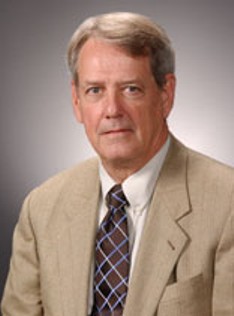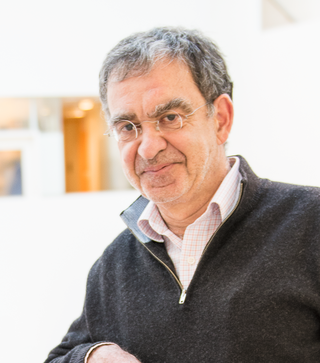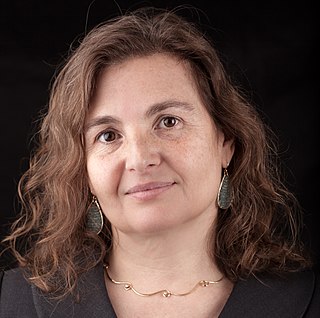
James Sacra Albus was an American engineer, Senior NIST Fellow and founder and former chief of the Intelligent Systems Division of the Manufacturing Engineering Laboratory at the National Institute of Standards and Technology (NIST).

A brain–computer interface (BCI), sometimes called a brain–machine interface (BMI) or smartbrain, is a direct communication pathway between the brain's electrical activity and an external device, most commonly a computer or robotic limb. BCIs are often directed at researching, mapping, assisting, augmenting, or repairing human cognitive or sensory-motor functions. They are often conceptualized as a human–machine interface that skips the intermediary component of the physical movement of body parts, although they also raise the possibility of the erasure of the discreteness of brain and machine. Implementations of BCIs range from non-invasive and partially invasive to invasive, based on how close electrodes get to brain tissue.
Neuroprosthetics is a discipline related to neuroscience and biomedical engineering concerned with developing neural prostheses. They are sometimes contrasted with a brain–computer interface, which connects the brain to a computer rather than a device meant to replace missing biological functionality.
Neural engineering is a discipline within biomedical engineering that uses engineering techniques to understand, repair, replace, or enhance neural systems. Neural engineers are uniquely qualified to solve design problems at the interface of living neural tissue and non-living constructs.
Bio-mechatronics is an applied interdisciplinary science that aims to integrate biology and mechatronics. It also encompasses the fields of robotics and neuroscience. Biomechatronic devices cover a wide range of applications, from developing prosthetic limbs to engineering solutions concerning respiration, vision, and the cardiovascular system.

Stephen Grossberg is a cognitive scientist, theoretical and computational psychologist, neuroscientist, mathematician, biomedical engineer, and neuromorphic technologist. He is the Wang Professor of Cognitive and Neural Systems and a Professor Emeritus of Mathematics & Statistics, Psychological & Brain Sciences, and Biomedical Engineering at Boston University.
Motor control is the regulation of movement in organisms that possess a nervous system. Motor control includes reflexes as well as directed movement.
Robot learning is a research field at the intersection of machine learning and robotics. It studies techniques allowing a robot to acquire novel skills or adapt to its environment through learning algorithms. The embodiment of the robot, situated in a physical embedding, provides at the same time specific difficulties and opportunities for guiding the learning process.
Neuroergonomics is the application of neuroscience to ergonomics. Traditional ergonomic studies rely predominantly on psychological explanations to address human factors issues such as: work performance, operational safety, and workplace-related risks. Neuroergonomics, in contrast, addresses the biological substrates of ergonomic concerns, with an emphasis on the role of the human nervous system.

The Shirley Ryan AbilityLab, formerly the Rehabilitation Institute of Chicago (RIC), is a not-for-profit nationally ranked physical medicine and rehabilitation research hospital based in Chicago, Illinois. Founded in 1954, the AbilityLab is designed for patient care, education, and research in physical medicine and rehabilitation (PM&R). The AbilityLab specializes in rehabilitation for adults and children with the most severe, complex conditions ranging from traumatic brain and spinal cord injury to stroke, amputation and cancer-related impairment. Affiliated with Northwestern University, the hospital is located on Northwestern’s Chicago campus and partners on research and medical efforts.
Neurorobotics is the combined study of neuroscience, robotics, and artificial intelligence. It is the science and technology of embodied autonomous neural systems. Neural systems include brain-inspired algorithms, computational models of biological neural networks and actual biological systems. Such neural systems can be embodied in machines with mechanic or any other forms of physical actuation. This includes robots, prosthetic or wearable systems but also, at smaller scale, micro-machines and, at the larger scales, furniture and infrastructures.

Tomaso Armando Poggio, is the Eugene McDermott professor in the Department of Brain and Cognitive Sciences, an investigator at the McGovern Institute for Brain Research, a member of the MIT Computer Science and Artificial Intelligence Laboratory (CSAIL) and director of both the Center for Biological and Computational Learning at MIT and the Center for Brains, Minds, and Machines, a multi-institutional collaboration headquartered at the McGovern Institute since 2013.

Daniela L. Rus is a roboticist and computer scientist, Director of the MIT Computer Science and Artificial Intelligence Laboratory (CSAIL), and the Andrew and Erna Viterbi Professor in the Department of Electrical Engineering and Computer Science (EECS) at the Massachusetts Institute of Technology.
Frank H. Guenther is an American computational and cognitive neuroscientist whose research focuses on the neural computations underlying speech, including characterization of the neural bases of communication disorders and development of brain–computer interfaces for communication restoration. He is currently a professor of speech, language, and hearing sciences and biomedical engineering at Boston University.

Daniel Mark Wolpert FRS FMedSci is a British medical doctor, neuroscientist and engineer, who has made important contributions in computational biology. He was Professor of Engineering at the University of Cambridge from 2005, and also became the Royal Society Noreen Murray Research Professorship in Neurobiology from 2013. He is now Professor of Neurobiology at Columbia University.
Konrad Paul Körding is a German neuroscience professor at the University of Pennsylvania and co-founder of Neuromatch. He is known for his contributions to the fields of motor control, neural data methods, and computational neuroscience, as well as his advocacy and contribution to open science and scientific rigor.

Stephen Harold Scott is a Canadian neuroscientist and engineer who has made significant contributions to the field of sensorimotor neuroscience and the methods of assessing neurological function. He is a professor in both the Department of Biomedical and Molecular Sciences and the Department of Medicine at Queen's University. In 2013, he was named the GlaxoSmithKline-Canadian Institutes of Health Research (GSK-CIHR) Chair in Neurosciences at Queen's. He is the Co-Founder and Chief Scientific Officer of Kinarm, the technology transfer company that commercializes and manufactures his invention the Kinarm.
Stefan Schaal is a German-American computer scientist specializing in robotics, machine learning, autonomous systems, and computational neuroscience.

Reza Shadmehr is an Iranian-American professor of Biomedical Engineering and Neuroscience at the Johns Hopkins School of Medicine. He is known for his contributions to the fields of motor control, motor learning, and computational neuroscience.
Mitra J.Z. Hartmann is a professor of mechanical engineering and biomedical engineering at the Robert R. McCormick School of Engineering and Applied Science at Northwestern University. She specializes in robotics, sensory acquisition behaviors, sensorimotor integration, and neuroethology. Her lab focuses on translating sensory signals felt by whiskers to robotics.